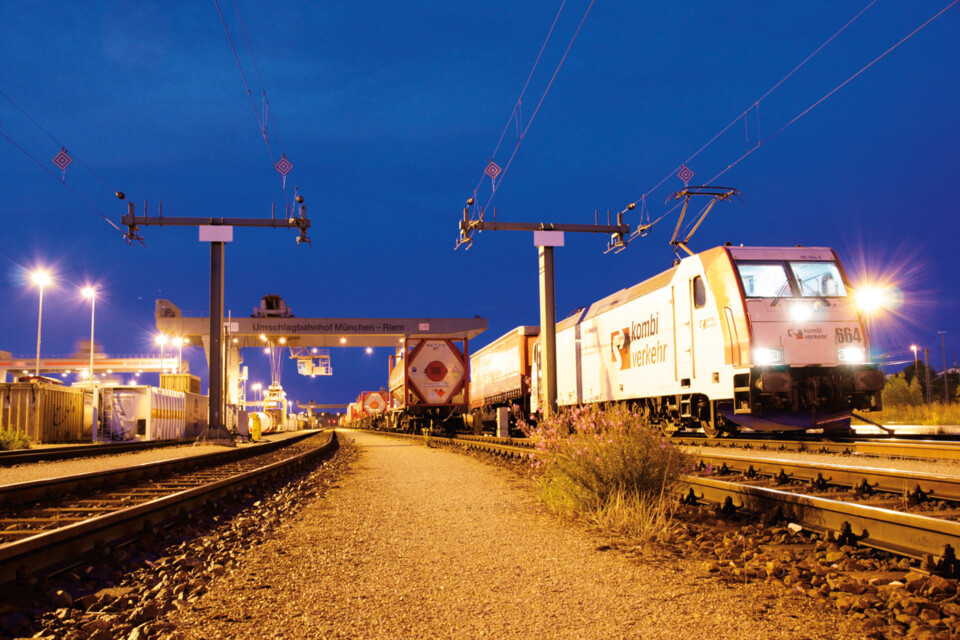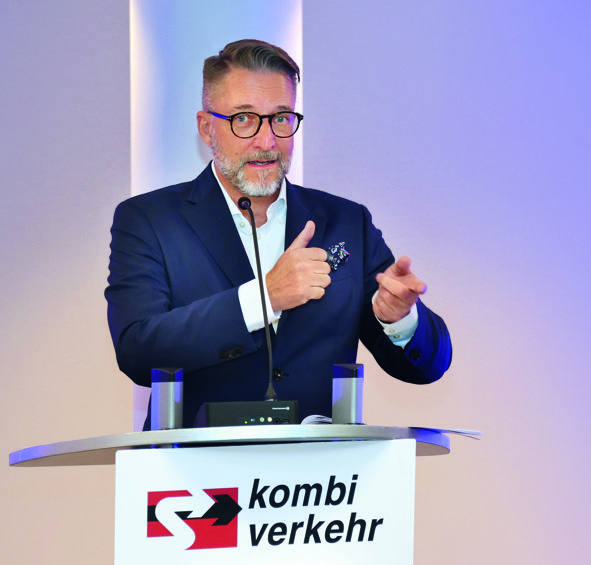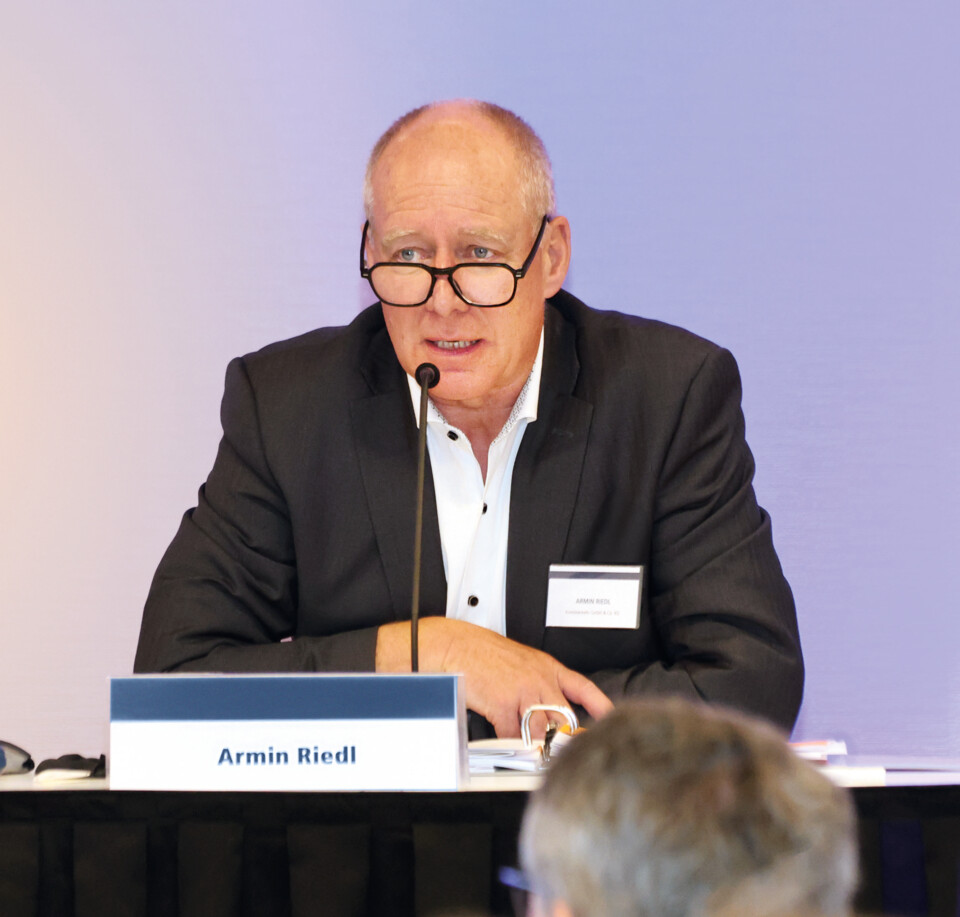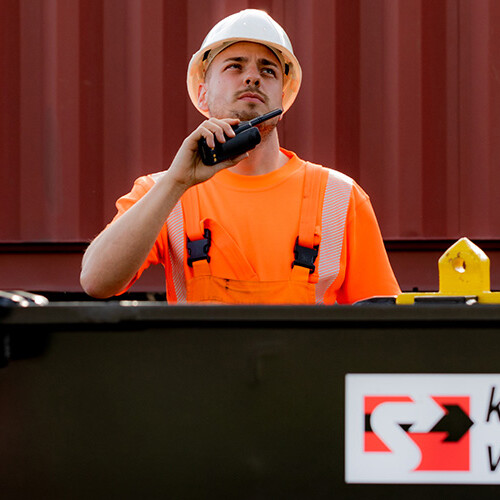- 769,733 truck shipments transported in the 2024 financial year
- Traction conversion successfully completed
- Train services readjusted
- DB InfraGO no longer in control of its own system
(Frankfurt am Main, 25. June 2025) Kombiverkehr GmbH & Co. KG has drawn up a mixed balance sheet for the 2024 financial year. In a challenging economic and operational environment, the company was able to stabilise its network and generate a positive annual result despite a decline in volume. In total, Kombiverkehr KG shifted 769,733 truck shipments (-5.6 per cent) from road and waterways to climate-friendly rail in the 2024 financial year and achieved an annual surplus of over EUR 215,000. The operator sees an urgent need for political action in the ongoing corridor renovations on the German rail network and in the regulation of track access charges. During the shareholders' meeting, the guests present engaged in a constructive dialogue via live link with Johannes Wieczorek, the new head of the Policy Affairs Department at the Federal Ministry of Transport, about measures taken by the federal government to realign intermodal transport.
Decline in volume despite network stabilisation
In the past financial year, Kombiverkehr KG transported 769,733 truck shipments (1.54 million TEU) on its network, with one shipment corresponding to the capacity of a truck or semi-trailer. Compared to the previous year, transport volume decreased by 5.6 per cent. Within Germany, 181,157 (-3.0 per cent) trailers, containers and swap bodies were transported, while in international business, the figure was 588,576 (-6.4 per cent) across all countries. Nevertheless, significant gains in shipments were achieved in traffic with Spain (+12.6 percent), France (+13.7 percent) and Poland (+46.4 percent).
In the operator's most important business segment, a total of 294,879 shipments were transported on block trains between Germany and Italy via Switzerland and Austria, as well as in bilateral traffic between Germany and Switzerland. This represents a decline of 6.9 percent compared to the previous year. The Brenner corridor accounted for 215,654 shipments, with a decline of only 1.5 percent. Southern Europe remains Kombiverkehr's strongest traffic segment, accounting for just under 40 per cent of the total volume. Contrary to the general trend, the transport volume in Benelux traffic in 2024 was up 0.9 per cent on the volume in the comparable year 2023. A total of 97,841 shipments were transported on trains between Belgium and the Netherlands and Italy and Germany.
With 106,417 shipments transported, traffic with Scandinavia via Baltic Sea ports and the fixed link was Kombiverkehr's second strongest international sales area in the 2024 financial year. The decline in volume on this axis amounts to 12.8 per cent compared to the previous year and is due, among other things, to the fact that the Hamburg – Taulov v. v. and Coevorden – Malmö v. v. connections were discontinued due to weak market demand.
Performing well in a difficult environment
The challenges were particularly high in 2024, with several factors coming together to affect the operator's core business. The ongoing economic downturn, particularly in Germany, significant operational performance deficits in train punctuality and the cancellation of a large number of train departures – both mainly caused by corridor renovations on the rail network – meant that no growth could be achieved in national and international transport. ‘Nevertheless, we performed well overall, both in terms of volume and economic results. We stabilised our train services despite the circumstances. Throughout the year, we were able to provide our customers with almost unrestricted national and international connections and, in some cases, even expand them,’ says Managing Director Armin Riedl, commenting on developments in the past financial year. Co-Managing Director Heiko Krebs added with regard to the first few months of the current year: ‘Unfortunately, we have not had a better start this year. We are still seeing significant restraint in the industry. The demand and interest in intermodal solutions are there. Unfortunately, however, this is not yet reflected in higher shipment numbers.’ From January to May 2025, Kombiverkehr KG transported around 290,000 shipments, 36,000 fewer than in the previous year.
The company's transport performance, measured in tonne-kilometres, fell slightly disproportionately by 6.3 per cent to 14.89 billion tonne-kilometres in the 2024 financial year. Customers from the freight forwarding and logistics sectors saved a total of 1.12 million tonnes of carbon dioxide from the environment with an average of 3,100 truck-rail transports per day on 248 traffic days. The company generated EUR 434.6 million in revenue from its intermodal transport business. This figure is virtually unchanged compared to the previous year. In the 2024 financial year, an annual surplus of EUR 216,012 was generated.
Strategic measures: network optimisation and traction conversion
In order to counteract the effects of the economic situation and network availability, Kombiverkehr focused on targeted measures to expand its network and optimise performance in 2024 and also in the current 2025 financial year. These included the introduction of new connections, an increase in departure frequencies on existing lines and the successful completion of the traction conversion to new forms of cooperation with existing and new rail transport companies. New structures and operational improvements have since ensured greater resilience and economic efficiency in ongoing operations.
Readjustment of transport services
Despite the tense situation, Kombiverkehr succeeded in introducing new train products in 2024. In March, a new train service from Rotterdam to Cologne-Eifeltor started with three round trips per week. This was followed in September by a new connection from Antwerp via Irun to Madrid. At the turn of the year, a train between Duisburg and Hallsberg in Sweden was added. In January 2025, Kombiverkehr also reactivated the direct train between Lübeck and Verona with two round trips per week, while selective consolidation took place at national level. In December 2024, the Ghent–Mortara v. v. route between Belgium and Italy was switched to a new route via France, particularly in view of the multiple Rhine Valley closures in 2025.
Transformation completed in just six months
Kombiverkehr KG successfully completed the traction conversion project in just around six months. Following the announcement in summer 2024 that the traction services purchased would be reorganised due to EU proceedings against the Federal Republic of Germany as the owner of DB Cargo, a total of 14 railway companies now operate Kombiverkehr trains. The four main freight carriers KombiRail Europe, Lokomotion, SBB Cargo International and DB Cargo are responsible for 90 per cent of the network. "Our aim was to secure our network for our customers as early and substantially as possible, despite all the uncertainties and unpredictability surrounding the outcome of the proceedings. The project has been a success, and our fears of having to make major cuts to our network have not materialised,‘ said Riedl. After initial teething problems with a process of this complexity, the system has settled down and is running largely smoothly. ’We now need to consolidate this. This is the foundation on which we will build in the future," added Krebs.
Return to construction under the rolling wheel
Kombiverkehr KG is concerned about the German rail infrastructure. The ongoing general renovations pose immense financial challenges for operators, railway companies and freight forwarders. The numerous construction activities – often without diversions – unfortunately compromise quality and lead to train cancellations amounting to ten to 15 percent of the services purchased. "The demand for resources in terms of personnel and locomotive hours is at an unprecedented record level. In addition, our customers have to pay for the storage of loading units at the terminals that have been left standing because planned trains have been cancelled as a result of the construction work. So it is the users of the combined transport system who are footing the bill. This has to change dramatically, and quickly, if companies operating climate-friendly intermodal transport are to remain active in the market once the renovation measures have been completed,‘ Krebs warns the new federal government. ’We welcome the fact that the network is being renovated. However, it is imperative that operations are maintained during the renovation. For us, therefore, the only option for renovations without efficient diversions is the old principle of building under the rolling wheel."
DB InfraGO no longer in control of its own system
In addition to the level of track access charges and pricing, the system of billing is another complicating factor in the handling of intermodal transport. "What is happening in Germany in the area of infrastructure is unique. We have the impression that DB InfraGo no longer has control over its own system. On the one hand, attempts are being made to control the system through a multitude of cancellation, advance payment and ordering regulations. On the other hand, promises made in 2024 to only start construction work on a corridor once the necessary diversions have been arranged without conflict are simply not being kept," Riedl criticises. According to the operator, it is unacceptable that the economic consequences of this type of network management are borne exclusively by the users. ‘The effects on the economy as a whole, for example in the case of the planned renovation of the Brenner corridor, are not foreseeable. The federal government, as the owner of DB InfraGo, must urgently make adjustments here,’ says Riedl.
Kombiverkehr is therefore calling on the new federal government, among other things, to completely overhaul the corridor renovation. The company has divided further demands into short- and medium-term measures in a catalogue. These include, for example, waiving track price increases for combined transport trains in 2026, exempting them from road tolls for pre- and post-carriage, and implementing a combined transport route based on the conditions for long-distance road freight transport.
Kombiverkehr KG's list of demands to the new federal government for fair competition between rail and road:
In addition to the demand
- Construction under the rolling wheel
we demand the following medium-term measures
- Planning security with regard to the availability of investment funds (terminals)
- Equal competitive conditions with long-distance road freight transport with regard to cancellation rules, infrastructure access costs and financial guarantees
- Implementation of a combined transport route based on the conditions of long-distance road freight transport
- Exemption from road tolls for pre- and post-carriage
In the short term, we propose the following measures:
- No track price increases for combined transport trains in 2026
- Suspension of the cancellation fee regulation for tracks for combined transport trains in 2026
- Compensation payments for diversions as a result of high-performance corridor renovations

Kombiverkehr KG transported 769,733 containers, swap bodies and semi-trailers by climate-friendly rail in the 2024 financial year. This generated revenue of €434.6 million.

Managing Director Heiko Krebs: ‘The demand for resources in terms of personnel and locomotive hours is at an unprecedented record level. The users of the combined transport system are footing the bill.’

Managing Director Armin Riedl: ‘What is happening in Germany in the area of infrastructure is unique. We have the impression that DB InfraGo no longer has control over its own system.’
KEY FIGURES FOR 2024 AT A GLANCE:
Total truck shipments transported: 769,733
International truck shipments: 588,576
Domestic truck shipments: 181,157
Total shipment volume in TEU (twenty-foot equivalent units): 1.54 million
Carbon dioxide emissions saved in tonnes compared to continuous road transport: 1.12 million
Transport volume in gross tonnes: 18.03 million
Average transport distance: 826 km
Freight volume in tonne-kilometres (tkm): 14.89 billion
Turnover in EUR: 434.6 million
Employees: 148
For a detailed presentation of the business results, please refer to the 2024 Annual Report.

